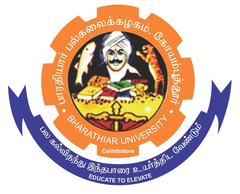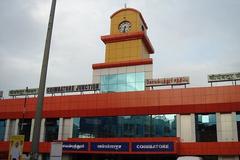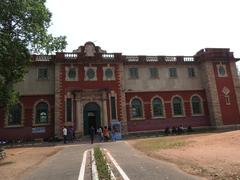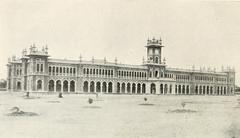Arulmigu Koniamman Temple: Visiting Hours, Tickets, Festivals, and Coimbatore Historical Sites Guide
Date: 03/07/2025
Introduction to Arulmigu Koniamman Temple
Located in the bustling heart of Coimbatore, Tamil Nadu, the Arulmigu Koniamman Temple stands as a beacon of spiritual devotion, architectural beauty, and cultural heritage. Dedicated to Goddess Koniamman—a revered local manifestation of Parvati and the city’s guardian deity—the temple is deeply woven into Coimbatore’s identity. Its origins trace back to the 11th century CE, and over the centuries it has evolved under the patronage of the Cholas, Nayaks, Marathas, and local philanthropists, culminating in today’s grand Dravidian structure crowned by a seven-tiered Rajagopuram. The temple is more than an architectural marvel; it is a vibrant center of religious worship, community life, and cultural festivities, most notably the annual Koniamman Car Festival (Ther Thiruvizha) and Panguni Uthiram, which draw thousands of devotees and visitors.
The temple offers a serene spiritual ambiance, enriching daily poojas, and spectacular festivals that showcase Tamil Nadu’s syncretic religious traditions. With free entry, easy accessibility, and proximity to other historical sites like VOC Park and Zoo and Marudamalai Temple, the Arulmigu Koniamman Temple is essential for pilgrims, tourists, and history enthusiasts. This comprehensive guide provides all the practical information you need—visiting hours, ticketing, rituals, travel tips, and more—to ensure a meaningful and memorable visit.
For authoritative insights, refer to YatraDham, Trek.zone, and Anubhava.
Table of Contents
- Introduction
- Historical Background and Evolution
- Significance of Goddess Koniamman
- Architectural and Artistic Highlights
- Major Festivals and Rituals
- Visiting Hours, Tickets, and Accessibility
- Practical Travel Tips & Nearby Attractions
- Visitor Experience and Etiquette
- Frequently Asked Questions (FAQ)
- Visuals and Media
- Conclusion and Recommendations
- Sources and Further Reading
Historical Background and Evolution
Origins and Early History
The Arulmigu Koniamman Temple’s roots extend to the 11th century CE, a period marked by flourishing South Indian temple architecture (YatraDham). Local legends recount that the area, once a dense forest, was chosen for the temple to invoke the goddess’s protection over the nascent settlement. The name “Koniamman” is derived from “Koyamma,” reflecting Coimbatore’s ancient name, “Koyampuththoor,” underscoring the temple’s integral role in the city’s history and identity.
Temple Development and Patronage
Originally a modest shrine, the temple saw significant expansion under the Cholas, with later enhancements during the Nayak and Maratha periods. The seven-tiered Rajagopuram, a striking feature with vibrant stucco work, was added in the late 20th century. The temple has benefited from continuous patronage, including recent modernization and restoration efforts to meet the needs of growing numbers of devotees and tourists.
Significance of Goddess Koniamman
Goddess Koniamman, a powerful local form of Parvati or Durga, is revered as the city’s protective deity. The main idol, made of black granite, symbolizes maternal compassion and divine strength. Devotees seek her blessings for prosperity, health, and protection. The temple complex also houses shrines for Ganesha, Shiva, and Murugan, reflecting the inclusivity of South Indian Hindu worship (Anubhava).
Architectural and Artistic Highlights
Dravidian Architectural Elements
The temple is a fine exemplar of Dravidian architecture, characterized by:
- Rajagopuram (Gateway Tower): A majestic, multi-tiered gateway adorned with colorful stucco figures depicting deities and mythological scenes.
- Sanctum Sanctorum (Garbhagriha): Houses the main idol in a dimly lit, serene chamber.
- Mandapams (Pillared Halls): Feature intricately carved pillars with motifs like yali and lotus medallions, serving as venues for worship and cultural gatherings.
- Vimana: The pyramidal tower above the sanctum, richly decorated and crowned by a golden kalasha.
- Sacred Temple Trees: The temple grounds include sacred trees like Neem, Vilwa, and Nagalingam, integral to rituals and local ecology.
- Oonjal Mandapam: A swing pavilion hosting the Oonjal festival, where the deity is ceremoniously swung during the Tamil month of Aadi.
The vibrant colors and artistic detailing are regularly refreshed, maintaining the temple’s visual splendor (Trek.zone).
Preservation and Renovation
Recent efforts focus on structural strengthening, conservation of sculptures, repainting towers, and improving visitor amenities such as ramps and accessible pathways. Arborists maintain the health of sacred trees, and the community actively supports preservation through funding and volunteering (YatraDham).
Major Festivals and Rituals
Panguni Uthiram & Ther Thiruvizha (Chariot Festival)
Celebrated in the Tamil month of Panguni (March–April), this is the temple’s most significant festival. The highlight is the Ther Thiruvizha, where the goddess’s idol is paraded in a grand chariot, accompanied by music, dance, and mass participation. The temple is vibrantly decorated, and special poojas are conducted, attracting thousands from across Tamil Nadu (Templeyatri.in; Poojn.in; Coimbatorelive.com).
Navaratri
Navaratri is celebrated with elaborate alankaram (decorations), extended poojas, and cultural programs. The temple glows with lights and hosts music and dance performances that honor the goddess (Templeyatri.in).
Other Festivals
- Diwali: Illuminated with lamps and special prayers.
- Pongal: Traditional sweet rice offering symbolizes gratitude and prosperity.
- Maha Shivaratri: Night-long prayers honoring the goddess as Parvati.
- Tamil New Year: Special abhishekams and prayers for well-being (Poojn.in).
Daily Rituals
The temple follows a disciplined schedule of poojas, including:
- Morning Abhishekam: Ritual bathing and decoration of the deity.
- Noon and Evening Poojas: Hymn recitations and bell ringing.
- Special Offerings: Pongal, garlands, fruits, and the lighting of lamps.
Community members often seek blessings for milestones like marriages, new ventures, and housewarmings, reinforcing the temple’s role as Coimbatore’s spiritual anchor.
Visiting Hours, Tickets, and Accessibility
Visiting Hours
- Daily: 6:00 AM – 12:30 PM and 4:00 PM – 8:30 PM
- Best Times: Early mornings or weekday evenings for a tranquil experience; festival days for vibrant celebrations
Entry and Tickets
- Entry: Free for all visitors
- Special Poojas: Advance booking for special rituals is possible via the temple’s official website or authorized agents; modest fees may apply (Poojn.in)
Accessibility
- Facilities: Ramps, handrails, and wheelchair-accessible pathways for elderly and differently-abled visitors
- Amenities: Clean restrooms, drinking water, shaded waiting areas, and ample parking
How to Reach
- Location: Centrally located near Town Hall, Coimbatore
- Nearest Railway Station: Coimbatore Junction (approx. 2-3 km)
- Bus Stand: Ukkadam and Gandhipuram bus stands are nearby
- Transport: Easily accessible by autorickshaw, taxi, and public transport (TripXL; TourTravelWorld)
Practical Travel Tips & Nearby Attractions
Dress Code and Etiquette
- Attire: Modest clothing covering shoulders and knees; sarees, salwar kameez, or trousers are preferred
- Footwear: Remove before entering the temple complex
- Conduct: Maintain silence, avoid disruptive behavior, and follow staff instructions
- Photography: Generally permitted outside the sanctum; always seek permission (TripXL)
Tips for a Rewarding Visit
- Visit on weekdays for a quieter experience
- Attend during major festivals for cultural immersion
- Carry water and avoid eating inside the temple
- Consider hiring a local guide for historical and cultural context
Nearby Attractions
- Perur Patteeswarar Temple: Ancient Shiva temple nearby
- VOC Park & Zoo: Family-friendly and educational
- Gass Forest Museum: Natural history exhibits
- Local Markets: Shop for South Indian textiles and handicrafts (Poojn.in)
Visitor Experience
The Arulmigu Koniamman Temple offers a tranquil yet vibrant atmosphere. Visitors can participate in daily rituals, witness grand festivals, and enjoy the peaceful ambiance. The temple serves as a center for community gatherings, charity, and the arts, embodying the city’s spiritual and cultural life.
Frequently Asked Questions (FAQ)
Q1: What are the temple’s visiting hours?
A1: 6:00 AM – 12:30 PM and 4:00 PM – 8:30 PM, daily.
Q2: Is there an entry fee?
A2: No, entry is free for all visitors.
Q3: Are guided tours available?
A3: Yes, local guides can be booked onsite or via travel agencies.
Q4: Is the temple accessible for differently-abled visitors?
A4: Yes, ramps and assistance are available.
Q5: Can tourists participate in rituals?
A5: Yes, all visitors are welcome to join daily poojas and festivals, respecting temple customs.
Q6: What’s the best time to visit?
A6: Weekdays for peace; Panguni Uthiram and Navaratri for festival experiences.
Q7: Is photography allowed?
A7: Generally allowed outside the sanctum; please confirm onsite.
Visuals and Media


- For virtual tours and more imagery, visit the official temple page.
Conclusion and Visitor Recommendations
The Arulmigu Koniamman Temple is not just a historical monument but the beating spiritual heart of Coimbatore. Its centuries-old traditions, architectural beauty, and vibrant festivals make it a must-visit for devotees and travelers. With its welcoming atmosphere, free entry, and accessible facilities, the temple offers a meaningful experience for all. Respect local customs, dress modestly, and consider a guided tour to deepen your understanding of this sacred site.
For real-time updates and enhanced travel experiences, download the Audiala app, follow us on social media, and explore related articles to enrich your journey through Tamil Nadu’s spiritual and cultural heritage.
Sources and Further Reading
- Arulmigu Koniamman Temple – YatraDham
- Arulmigu Koniamman Temple – Anubhava
- Koniamman Temple – Trek.zone
- Coimbatore’s Koniamman Temple: A Spiritual Journey – Poojn.in
- Koniamman Temple in Coimbatore – Templeyatri.in
- Kovai Yellow Pages
- Dinamalar Temple
- TripXL: Koniamman Temple
- TourTravelWorld: Koniamman Temple
- Coimbatorelive.com





